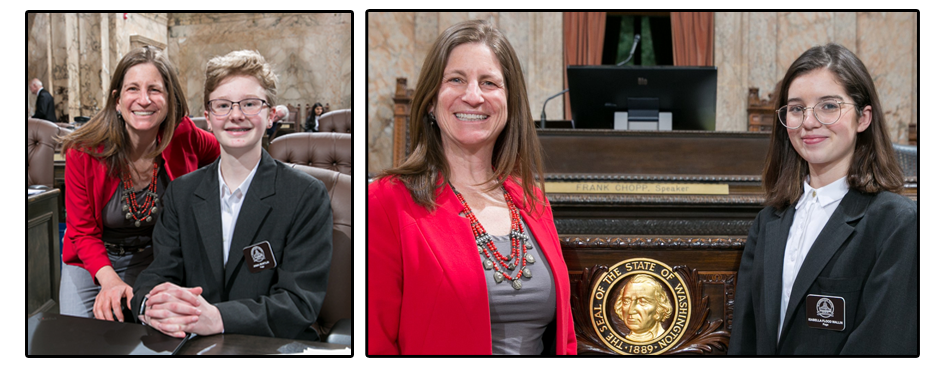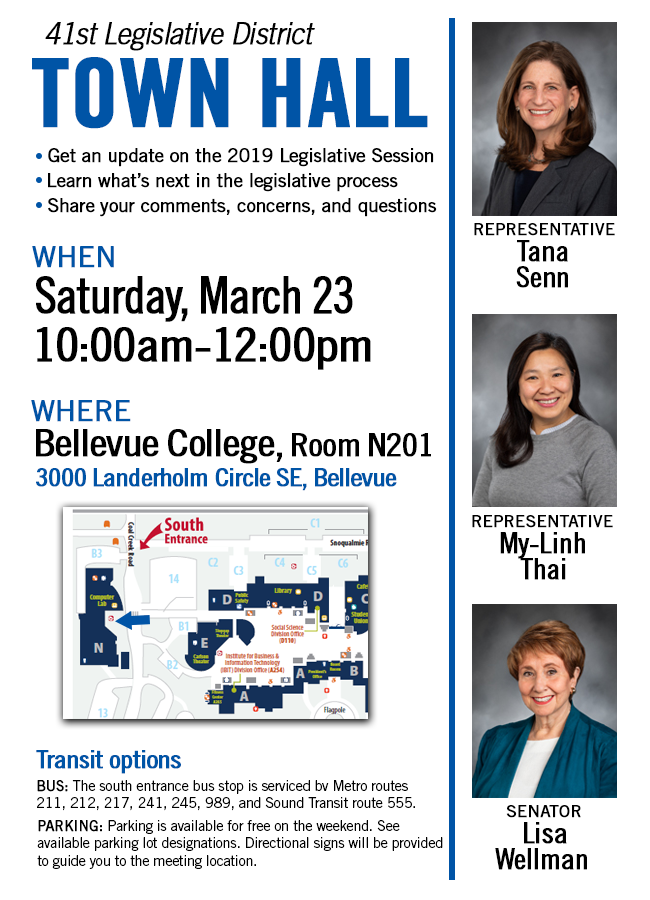We have been putting in a lot of long hours and late nights voting bills out of the House, but it has all been worth it as we pass great legislation!
This week I had the pleasure of sponsoring two pages, Anna Bertlin who attends Islander Middle School and Isabella Flood Wallin who attends Summit Sierra High School.
The page program is a great opportunity for young people to see the legislature up close. For more information, please visit the House Page Program website.
Updating laws about hate crimes
Sadly, hate crimes are present and increasing in many places, including our own Eastside communities. Our laws need to keep up. From 2016-2017, hate crimes increased in Washington by 42%, far outpacing the national increase of 17%. Allowing this to continue is not only a threat to the people who are victims of hate crimes, but also adds to the overall sense of fear that plagues many targeted communities.
Last week, the House passed HB 1732, which renames the offense of “Malicious Harassment” to call it what it is – a “Hate Crime Offense.” The legislation adds “gender identity or expression” to the list of protected categories and expands the threats that can be considered hate crimes to include defacing or vandalizing religious property with derogatory words or symbols and damaging or attempting to remove faith-based attire. HB 1732 also increases the maximum civil liability for those guilty of committing hate crimes from $10,000 to $100,000.
In addition, the bill creates an advisory work group that would take a closer look to identifying the root causes of and preventing hate crimes.
With this legislation, House Democrats are not only creating a stronger law, we are sending a signal that hate crimes and the fear they stoke will not be tolerated.
Helping our Southern Resident orcas
 We have 75 Orcas left. That’s it. Only 75. The resident orca whale, the state’s official marine mammal and a significant symbol for Native Americans in our region, is on the verge of extinction. If we don’t protect them now, pretty soon all the Southern Resident killer whales will be gone.
We have 75 Orcas left. That’s it. Only 75. The resident orca whale, the state’s official marine mammal and a significant symbol for Native Americans in our region, is on the verge of extinction. If we don’t protect them now, pretty soon all the Southern Resident killer whales will be gone.
Fortunately, the House is taking bold actions, passing several bills last week to help our orcas.
Chinook salmon are the main food source for the Southern Residents. HB 1579 would increase habitat for Chinook salmon and the forage fish that the Chinook eat so that there is more for the orcas to eat.
Noise from nearby boats, including whale-watching boats, can interfere with the orcas’ ability to echolocate and find food. With less fish in the water, it has become even more essential for the orcas to be able to feed without being disturbed. HB 1580 would require that boats stay farther away and create a go-slow bubble around the orcas to reduce vessel noise and disturbance.
Thirty years ago, the Exxon Valdez oil spill occurred in Prince William Sound. The spill essentially wiped out the orcas in that area, with the orcas that survived the initial disaster no longer reproducing. HB 1578 would reduce the catastrophic threat of an oil spill to Southern Resident orcas by improving the safety of marine oil transportation.
I strongly support all of these bills and trust that they will make a difference so that our kids, and their kids, get to see their official marine mammal thriving in Washington waters once again.
Photo by Mike Charest/Flickr
Helping parents finish community college
 The Working Connections Child Care (WCCC) program provides low-income parents with a childcare subsidy so they can re-enter the job market. Under current law in just two states, Kentucky and Washington, full-time college students also need to work between 16-20 hours per week to satisfy the work requirements of the WCCC program. Going to school as a parent with young kids is enough of a challenge; adding in the work requirement often means that people cannot complete their degrees.
The Working Connections Child Care (WCCC) program provides low-income parents with a childcare subsidy so they can re-enter the job market. Under current law in just two states, Kentucky and Washington, full-time college students also need to work between 16-20 hours per week to satisfy the work requirements of the WCCC program. Going to school as a parent with young kids is enough of a challenge; adding in the work requirement often means that people cannot complete their degrees.
House Bill 1303 removes the work requirement for WCCC benefits for parents who are full-time students at community, technical, or tribal college and pursuing a certificate in the high-demand fields of nursing, early childhood education, mental health or paraeducation.
When parents are able to focus on their studies and on parenting, it is a win for parents, kids and the economy. Parents can get better jobs and their kids grow up in more financially stable households. I am proud to stand up for parents and make sure they get the support needed to be successful in college and beyond.

